Help! I Suffered a Spinal Cord Injury Working at a Factory – What are My Legal Rights?

Factories form the lifeblood of some states, and hundreds of thousands of families rely on these facilities for their daily bread and sustenance. Factory workers can be either sex, and they are provided with basic training on machinery operation as well as safety protocols to ensure their productivity and overall safety. That being said, the act of working at a factory which features moving parts, heavy objects, hazardous machines and so on makes these types of jobs inherently risky. Factory injuries range in their severity, but spinal cord injury is one of the most catastrophic and life-changing, often necessitating a change in one’s career, or even early retirement due to complete disability.
OSHA is a governmental body which is charged with the task of ensuring employers follow safety protocol and provide workers with training and personal protection equipment or PPE so they are kept safe at all times. It is estimated that over 90 percent of all injuries have a human negligence aspect to them, which means freak accidents with no apparent cause are the exception, and not the norm. In addition, it is estimated by the Bureau of Labor Statistics that falling objects caused over 74,000 workplace injuries across the country in 2021, with most of these injuries involving the spinal cord. It is important to note that you have rights under workers’ compensation law, but these rights barely provide you with enough compensation to rebuild your life, which is why you need timely legal representation for spinal cord injury lawsuits, and we’re here to help with that.
Are you looking for a factory injury attorney? If you sustained a spinal cord injury while working at a factory in any state in the country, you may be able to recover compensation in order to rebuild your life, pay for your medical costs, reimburse you for lost wages, ease your pain and suffering, access rehabilitative services and so much more. The experienced injured factory worker lawyers at McCready Law have helped thousands of individuals just like you who have suffered catastrophic injuries restore their lives after suffering a catastrophic injury. What sets us apart from other law firms is our national reach, and the fact that we are not afraid to litigate if the insurance company is not amenable to our demands.
Most law firms will balk at the thought of taking a case to court as they may not have the experience or the resources to do so, and may opt to settle for an insurance company payout which for the most part is a fraction of what you would get if you were to litigate. We run a bilingual office (hablamos Espanol) and we take on all cases on contingency fee basis, which simply means that there are ZERO UPFRONT FEES for the duration of the processing of your claim, as we only recover our legal fees at the end of the process, and only if we’ve won your case for you. If you suffered back or spinal cord injuries from falling objects as you worked at a factory, we can help: please call us NOW at 312-444-0214 regardless of where you are in the country, and speak to one of our best spinal cord injury attorneys to learn more about your legal options for justice and compensation.
Factory Hazards That May Lead to Spinal Cord Injuries
Here are some of the ways material can fall from heights inside factories, leading to spinal cord injury:
- Mechanical Failure
Machines must be serviced and replaced regularly in order to keep them working in a predictable manner. Not doing may lead to mechanical failure, which can cause components such as crane cables, brakes, and gears to fall apart, causing them or the loads they carry or support to come crashing down onto an unsuspecting factory worker.
- Operator Error
Hoist and crane operators play a pivotal role in the safe handling of factory products and materials. To this end, they must be alert, have the necessary training to handle this equipment and possess a sufficient amount of experience to ensure they do not make the mistakes an inexperienced operator would. Operators that don’t possess the requirements named above may be prone to letting the crane swing uncontrollably, losing control of loads and rigging the load using improper techniques. All of these contribute to operator errors, making it more likely for loads to fall unto unsuspecting workers below.
- Overloading
Factory components such as conveyor belts, cranes and shelves can only hold a certain amount of weight when it comes to materials, past which they may collapse and drop the materials they are either transporting or storing. Overloading may be caused by factors such as improper labeling, inaccurate load assessment, failure to understand the limitations of equipment, structural weaknesses, poor inspection and work supervision, as well as trying to forcefully maximize lifting or storage capacity.
- Workplace Collisions
Factories can be large structures, and trucks, cranes and forklifts may be required to move goods and materials from one part to the other. Should these vehicles collide with other vehicles or stored material, overhead objects may come tumbling down and fall on an unwitting worker. Poor visibility, narrow aisles, a culture of obstructing pathways as well as lack of operator training can all contribute to spinal cord injuries in factory workers from falling objects.
Complications With Spinal Cord Injuries
Here are some of the complications associated with spinal cord injuries in factories:
Paralysis
Perhaps the most severe and catastrophic complication associated with spinal cord injury, paralysis is referred to as the loss of voluntary movement or sensation below the level of the injury. Paralysis can either be quadriplegia, or paraplegia, with the former referring to paralysis of all four limbs, and the latter, the lower body. If, however, one suffers incomplete spinal cord injuries, one may still be able to maintain a semblance of sensory or motor function below the level of the injury, also known as partial paralysis.
Loss of Bladder and Bowel Control
The spinal cord contains nerve sheathes which branch out to different organs, helping to innervate them so they can relax or contract. Any type of damage to the spinal cord may damage these nerves, and nowhere is this more apparent than in the bowel and bladder. Spinal cord injury patients may suffer incontinence, or the loss of bladder and bowel control and may require catheterization in order to void the bladder as well as diapers so they do not soil themselves and develop infections.
Chronic Pain
Nerves conduct sensations such as cold, heat and pain, and spinal cord damage may interfere with the conduction of these sensations, heightening them to unbearable levels. Spinal cord injury patients may have to contain with a phenomenon known as neuropathic pain, which is described as tingling, burning or a shooting sensation which can be ongoing, requiring pharmacological and psychological interventions.
Proving Negligence in Factory Spinal Cord Injury Cases
Proving negligence when it comes to factory spinal cord injuries sustained due to falling objects isn’t as cut and dry as you may think: just because something fell on you leading to your injuries doesn’t mean you have a valid claim. To begin with, you must prove that your employer had a duty of care to provide and maintain a safe working environment for you and your colleagues. This usually means that you signed a work contract making you a bona fide employee, and that they took reasonable steps to identify potential hazards and secure said hazards. In addition, they are legally required to have in place safety protocols as well as provide PPE for their workers and train said workers on machine operation and maintenance.
After establishing duty of care, you must show that this duty of care was breached via a negligent act such as failure to implement safety protocols, failure to provide workers with PPE, hiring inexperienced and unqualified crane and forklift operators, poor or no maintenance of machines and so on.
Next, you must show causation between your injuries and the negligent incident that caused said injuries. This can be accomplished through eyewitness accounts, expert testimony from engineers, surveillance footage and so on.
Lastly, you must show that your injuries are compensable via damages you sustained. These damages can be things like medical expenses, pain and suffering, lost wages, loss of potential future earnings, cost of rehabilitation, loss of enjoyment or life, permanent disability and so much more.
Best Spinal Cord Injury Attorneys – Call Us Today!
Spinal cord injury lawsuits are sensitive due to the catastrophic nature of these injuries. You may need ongoing and specialized treatment, and you may most likely require extensive surgery in order to repair the damage done by the event, and all of this costs a considerable amount of money. You may also not be able to return to work for a long time, and to this end, you will require reimbursement for lost wages as well as financial assistance for rehabilitative and in-house care. We understand that you are going through difficult times at the moment, and the last thing on your mind is filing an injury claim due to the perceived stressful nature of lawsuits: however, we will take over the entire process and only reach out to you for basic information; we will liaise with your employer, the insurance company, refer you to specialists and investigate the accident scene so we can create a comprehensive picture of your injuries and the negligence that precipitated them. If you’d like to speak with someone regarding your factory injury lawsuit and its value, please reach out to us NOW at 312-444-0214 to learn more about how we can help. The call is 100% FREE. Thanks for choosing McCready Law, and we look forward to helping you.

